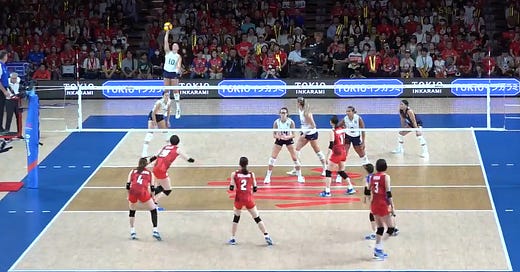Summer 2024 Mailbag - Part 1
Going from player to coach, recording video clips, and going deep on passing short serves
More in this series:
Summer 2024 - Part 2
Summer 2024 - Part 3
Daniel L in Coaching Eyework Pt1:
Good afternoon Joe, great read as always and appreciate your honestly and transparency especially when you talk about when a player asked you about watching her and you answered with I did not as I was looking at X instead. I believe that type of transparency goes a long way and players in return recreate the situation to make sure you see if there is improvement or not.
As for the development and progress of a young/not as experienced coach (highschool, club, beach), where does one's personal expereince of the game come into play. Not at one point did you talk about your personal experience of learning the skill or implementing it yourself at some point in your playing career (not sure if you played volleyball, actually). Does personal playing experience matter as a coach in your eyes? Is this subjective?
Your personal experience comes into it. I did play. I was good for my local area in high school and was a D3 All-American. My earliest coaching experience was helping my parents out while I was still in high school. So of course, at that point I was only drawing from my couple years as a player. I think, however, the danger is letting your playing experience become a barrier. Unless you're the best in the world at a given skill, there's always somebody better than you. And even if you are a world-class player, playing isn't teaching.
The first skill I think I got really good at coaching was passing, but I was actually never much of a passer as a player. Or never considered myself very good, at least. But when I met Carl McGown, and he said, "pass like this," and showed many of the world's best passers passing in that way, I was able to say, "okay, cool," and then pretty much immediately starting teaching players to pass that way. On the flip side, my coaching of attackers probably took longer to develop because I held on to teaching players to "hit like me" for longer.
Here’s where I think personal experience as a player is most valuable: you can relate to your players as learners. This is where high-level players can actually lose it when they coach less-advanced players though, because they forget what it was like to be at that level. Oddly enough, I probably draw more on my experience learning and competing (at a low level) in BJJ, because I came into that sport as an adult beginner. Even though that was more than 10 years ago, I can still remember the feeling of thinking I was doing something correctly and the coach being like, “umm… no. That’s not it.”
So draw on your playing experience, just be leery of drawing on it to teach players how to play like you. Odds are, there’s better technical models for them :)
Tayyiba Haneef-Parked talked about going from player to coach in this webinar from a couple years ago. There’s some good insights in there.
A reader asks:
Quick question...what/how are you ripping the clips? Are you using screen recording software, and getting clips from volleymetrics?
I use a screen capture software. Specifically I use one called Movavi, but I can’t really say it’s better or worse than other comparable products. Honestly, the price seems a bit ridiculous, but I guess everything is subscription model nowadays.
My main beef with Movavi is that the old version used to remember the last window size you used. So when I’m cutting a lot of clips from Volleymetrics, it was nice when you’d load the program up and it would automatically be sized to the VM window. Small gripes though.
Now that I’m using Balltime a lot more, I may start using their video editor, but I’ve actually found it’s a bit faster and easier to just screen record the window still. Balltime isn’t quite as fast as the Volleystation video clipper, which I really like.
An attendee at the Reception Systems webinar:
Hey Joe - loved the webby. My iPad got weird when I tried to enter a Q in chat - so here:
I see individual players who do not have deep pass skills - but as I walk through the big tournaments I see 5:1 short:deep ace ratio of that 14’ Flean dropper that is just eating players alive. What technical and tactical cues are you giving players to fight back here, especially given need to balance some, protect vs deep aces, too?
Well I think you kind of said it... it's the ability to open up and pass deep that actually gives players the ability to stand a bit farther up on the court and not get beat by the droppers. A lot of club players are standing at 22' or so and they have a "stay behind the ball" mentality. So both in literal positioning on the court as well as posture/mindset, they are not ready to play forward and cut the ball off. Players who have a "cut the ball off" and "get it early" mindset are already thinking about "attacking the serve" are less likely to get droppered to death. Although we see that even elite passers get buckled on good dropping serves sometimes - which is why we need to train it in our servers!
So, my checklist is:
Keep reading with a 7-day free trial
Subscribe to Smarter Volley by Joe Trinsey to keep reading this post and get 7 days of free access to the full post archives.



